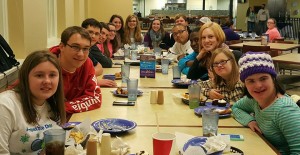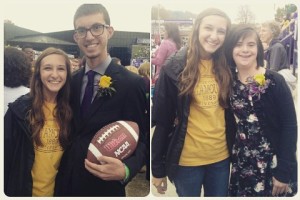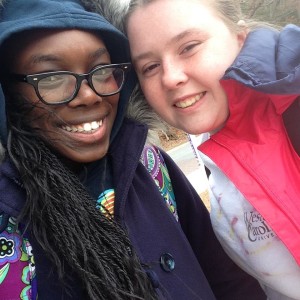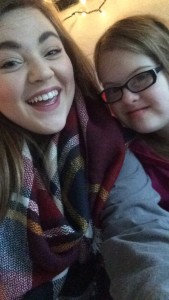“I can’t express to you how much this program means to me, how much the students, volunteers and staff have influenced and touched my life,” said two-year volunteer and now paid natural support for Western Carolina University’s University Participant Program (UP), Grayson Coleman.
Coleman’s response is much like many other volunteer reactions when asked how the UP Program has changed their lives for the better.
According to their website, the UP Program is designed to provide an inclusive, on-campus living and learning experience for college-aged students with intellectual disabilities for two years. The goal of the program is to help UP students transition from secondary education to adult life. This goal is brought to life through education, independent living and employment support as students set their own schedules and individualized goals for college participation.

UP students and volunteers share a meal together in the cafeteria. Photo provided by Alex Elgin.
The UP Program is partially funded as a part of the Transition and Postsecondary Programs for Students with Intellectual Disabilities (TPSID). UP also receives funding and services from many community partners, like the Community Foundation of Haywood County and The Evergreen Foundation.
While UP students are fully integrated into regular college life – there are no separate classrooms, facilities or residential areas – the program’s dedicated volunteers are always nearby to offer guidance and friendship.
According to UP Program co-Director, Kelly R. Kelley, the program has expanded immensely since its inception in 2007. While the program began with only 10 volunteers, the help has grown to around 260 volunteers today. The majority of student volunteers are unpaid, but according to Kelley, some paid supports are hired out of the pool of already active volunteers. These paid supports are tasked with the more delicate duties, like helping with classwork. Paid supports work 10-15 hours a week, while unpaid volunteers are considered active at 1-2 hours a week.
Lukisha Harmon, an UP volunteer, fell in love with the program after completing mandatory volunteer work for her recreational therapy class in the fall of 2015. After witnessing how the UP students grew throughout the semester, Harmon knew she wanted to stay involved with UP.
“I love seeing how they can go from needing my assistance with something, but then eventually becoming completely independent in that same aspect. It’s really amazing to witness,” said Harmon.
“We have meals together, go to the gym, complete daily tasks like cleaning and washing clothes, and just hang out around campus. Occasionally, I help with homework and special education (SPED) lessons,” Harmon said. “I loved working with the students so much that I completed my mandatory hours within the first two weeks of classes!”
Harmon continued to work with UP throughout the semester, putting in far more hours than were required from her, and was recently recognized as the UP Program’s “Volunteer of the Month”.
Assisting in every part of college life
While the academic side of volunteering is hugely important, volunteers are trained to be helpful in every area of college life. They can accompany UP students to games, social events, movies and plays, even off campus adventures and shopping trips.
Kelley said volunteers are not expected to be a crutch for UP students or to do their work for them, but instead are expected to be a positive support system, a good role model and a friend.

Alex Elgin poses with the 2014 Homecoming King and Queen, UP students Trace Shuler and Ali Hale. Photo provided by Elgin.
“Same age peers really help UP students feel positive peer pressure,” she said.
According to Coleman, volunteers and paid supports are responsible for helping UP students in all areas of the Individualized Plan for College Participation (IPCP). IPCP goals consist of personal development, vocational preparation, social participation and learning, community participation and course participation, Coleman explained.
“My goal is to help support the students as much as I can so that they can grow as individuals and achieve their goals so that they will be ready to independently live in their own communities after college,” said Coleman.
In addition to aiding in academics and social activities, some volunteers provide more personal care as suitemates, like Alex Elgin, who lives with two UP students on campus. Suitemates help UP students adjust to on-campus living by encouraging independent living skills, like cooking, cleaning, hygiene and home maintenance. UP suitemates also help students learn leadership and self-advocacy skills by participating in residence hall activities and teaching them to be independent away from home.
Elgin began working with UP in the fall of 2014 as a volunteer. Like Harmon, she was required to complete volunteer hours for a class, but it quickly turned into much more than just credit hours. “I enjoyed spending time with the UP students and just picked up as many shifts as I could to get to know them more!” Elgin said.
After volunteering for a semester, Elgin became a paid natural support for the program in 2015, and she became a suitemate this past fall, where she serves as a resident adviser for the two UP students she lives with. Elgin said working with the UP Program has made her even more excited to become a special education teacher one day.
Teachable moments and memories
“We want the volunteers to work with our students in many different areas to enjoy the college experience they share together,” said Kelley.
As Kelley put it, this experience allows many “teachable moments” for both students and volunteers. The UP Program holds monthly meetings, where volunteers problem solve, give praise reports and come up with ways to make the experience even better for everyone.

UP volunteer Lukisha Harmon with her UP buddy, Lizzie King. Photo provided by Harmon.
Kelley said that even she still continues to learn from the program.
“Sometimes student volunteers have even better ideas and I get to take the backseat and let the students lead and learn, which is awesome,” she said laughing.
While student volunteers help make this program successful, they are also benefiting from it themselves. From marketing and anthropology to education and engineering, according to Kelley, there are volunteers who major in every area of study – and volunteering helps them in every single one.
“Volunteers get hands-on experience working with everyday issues. You never know when you’re going to encounter a person with disabilities. Volunteers can take their experiences with them no matter the profession they go into,” said Kelley.
That learning experience is real indeed, according to volunteer testimony.
“I find that I learn more from [UP students] than they do from me,” said Alease Harris, a WCU freshman who has been volunteering with the UP Program since the beginning of the semester. “They really help me remember to be kind and positive.”

UP student Paige Soderman poses with UP volunteer Alease Harris. Photo provided by Harris.
UP provides volunteers with valuable life and learning experience, but it also gives them memories they can hold onto after leaving WCU.
Harris spoke fondly of a time when she went for her night shift with UP student Trace Shuler.
“He found out that I sang choir and did musicals in high school, and he asked me to sing with him,” she said. To calm him down after a rough day, the pair sang “You Are the Music in Me” from High School Musical for almost her entire shift. “It was nice to see that I could actually have an effect on him and how his day was … This whole UP experience has changed my outlook on a lot of things,” said Harris.
Coleman wrote a blog post in September 2015 that details the impact UP has had on her life. “I thank Western Carolina for offering a program so amazing,” she said in the post.
Kelley and UP volunteers agree that the inclusiveness that the program brings to WCU’s campus is irreplaceable.
“This experience has shown me how important diversity and inclusion really is. I never understood the importance of inclusion until I began working with these students. They are really inspiring,” said Harmon.
“I can definitely say that every single one of the UP students hold a special place in my heart,” Elgin said. “I am touched to be a part of this program that everyone will continue to remember for years to come.”
Every semester, the UP Program creates a YouTube video celebrating the memories shared between UP students and volunteers. Below is the video uploaded by the North Carolina Council on Developmental Disabilities in December 2015 to commemorate this past fall semester:


